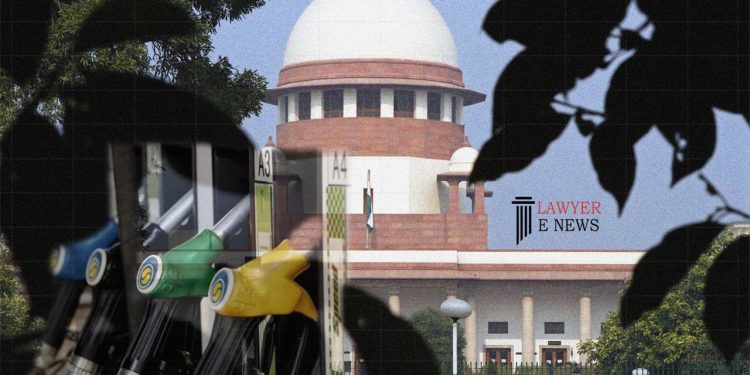Retail Petrol Pump in large cities must install VRS within timeline – Supreme Court

Supreme Court in a recent Judgement (M/s Indian Oil Corporation Limited Vs. V.B.R. Menon & Others D.D. 14th March 2023) directed the CPCB to ensure that its guidelines for the installation of Vapor Recovery Systems (VRS) in petroleum outlets are strictly followed and all retail petroleum outlets in cities with a population of more than 10 lakh and a turnover of more than 300 KL/Month install the VRS mechanism within the prescribed timeline. The State Pollution Control Boards have been directed to ensure compliance with these guidelines and proceed against erring outlets in accordance with the law.
The Indian Supreme Court has modified the directions issued by the National Green Tribunal (NGT) in a legal case where multiple appeals were made to challenge an order passed by the NGT’s Southern Zone, Chennai. The lead matter in this case is Civil Appeal No. 2039 of 2022, filed by Reliance BP Mobility Limited against the NGT’s order directing the Central Pollution Control Board and State Pollution Control Boards to issue directions to make it mandatory to obtain Consent to Establish and Consent to Operate for new and existing retail petroleum outlets.
The NGT’s original application was filed by a resident of Chennai, raising the issue of non-installation of Vapour Recovery Systems (VRS) in petroleum outlets by oil marketing companies. The NGT disposed of the application by directing the installation of VRS mechanisms in petroleum outlets within specific timeframes and imposing environmental compensation for non-compliance. The Central Pollution Control Board and State Pollution Control Boards were directed to issue directions under various environmental protection acts to make it mandatory to obtain consent for new and existing retail petroleum outlets.
The NGT has jurisdiction and powers outlined in Sections 14 to 20 of the NGT Act, which include both original and appellate jurisdiction. The NGT can adjudicate upon civil cases relating to the environment, grant relief and compensation to victims of pollution, and order restitution of property or the environment. If an award or order of the NGT is not complied with, the person in whose favor the award was passed can seek execution of the award under Section 25 or seek prosecution of the offenders before a criminal court under Section 26.
The Supreme Court in this case has held that the directions issued by the NGT making it mandatory for petroleum outlets to obtain Consent to Establish and Consent to Operate are not reasonable and need to be modified. The Court has also noted that the Central Pollution Control Board (CPCB) has classified automobile fuel outlets as “green” and exempted them from consent management in its directions/guidelines dated 30.04.2020 and 07.03.2016.
The Court has directed the CPCB to ensure that its guidelines for the installation of Vapor Recovery Systems (VRS) in petroleum outlets are strictly followed and all retail petroleum outlets in cities with a population of more than 10 lakh and a turnover of more than 300 KL/Month install the VRS mechanism within the prescribed timeline. The State Pollution Control Boards have been directed to ensure compliance with these guidelines and proceed against erring outlets in accordance with the law.
Overall, the Supreme Court has modified the directions of the NGT and has directed the CPCB and State Pollution Control Boards to ensure compliance with their respective guidelines for the protection of the environment.
M/s Indian Oil Corporation Limited Vs. V.B.R. Menon & Others






